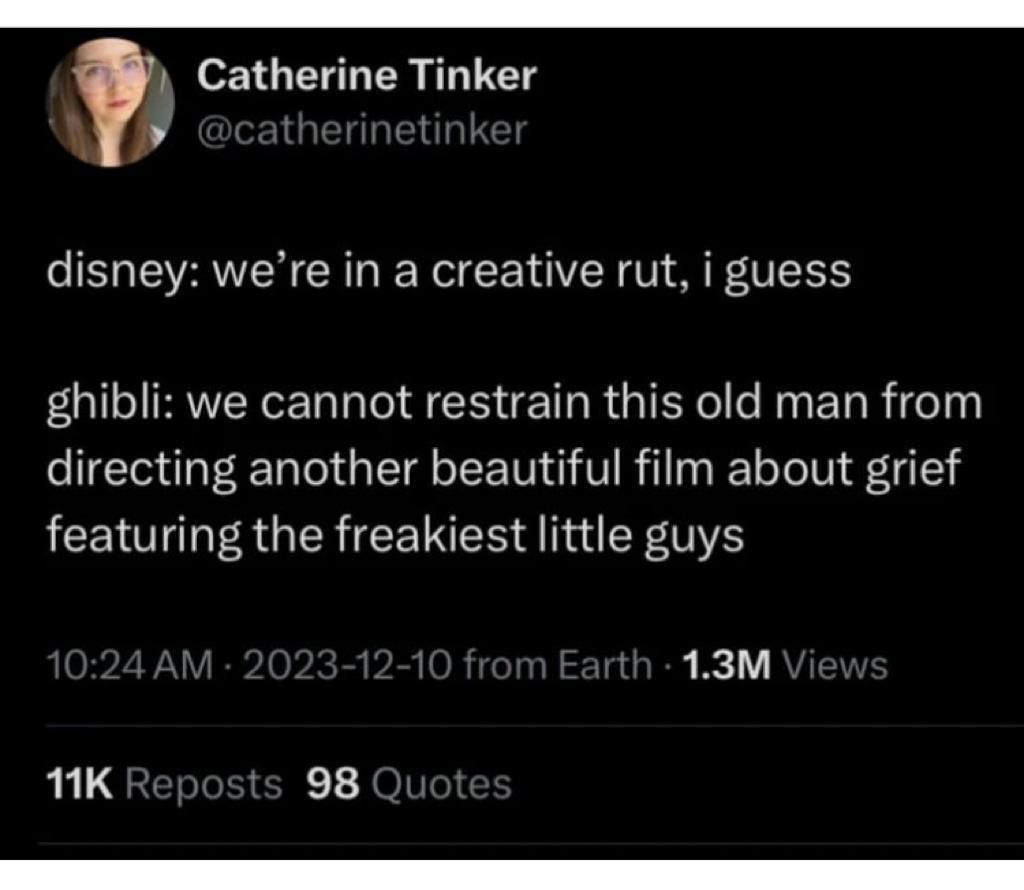2023 saw the 100th anniversary of The Walt Disney company – and a year of successive box office flops and award snubs. After a century in business, is everything still alright behind the picture-perfect facade, or are the cracks starting to show in this castle?
Where once there were Oscars
Disney has won a total of 150 Academy Awards between 1932 and 2024. Of these, 32 were won by Walt Disney personally. These awards were won across various categories, from Short Films to Best Original Song, Special Effects and Best Animated Feature.
The Best Animated Feature category is a relatively new addition to the Academy’s lineup, having only been introduced in 2002 for films released in 2001. Before the introduction of this special category, Disney’s signature animated films, including their respective songs, soundtracks, editing and effects, were judged alongside live-action films with no distinction between them. So in 1992, when Disney won Best Song for “Beauty and the Beast”, they competed against and beat the Bryan Adams hit “(Everything I Do) I Do It for You” from Robin Hood: Prince of Thieves. For me, those pre-2002 Oscar wins are a testament to Disney’s ability to make animated films of such calibre that they could compete on the same level as live action.
Following that logic, you would think that Disney would absolutely dominate the Best Animated Feature category from 2002 onwards. Unfortunately, the timeline simply doesn’t align. Disney’s “Renaissance” period, which is universally believed to have produced its best and most memorable films, was between 1989 and 1999. By the time the new Academy Awards category was revealed, Pixar Studios had taken over as the belle of the ball.
Absorbing Pixar in 2006 put Disney back on the winning streak in this category, from 2007’s Ratatouille to 2021’s Encanto, with Disney losing the Oscar only twice, to Spider-Man: Into The Spider-Verse (2019) and Rango (2012). But that’s where the good news ends. The award for Best Animated Feature, a category that you would expect an animation powerhouse like Disney to own, has continued to elude them since 2021.
Who’s eating Disney’s lunch?

This year, the Oscar for Best Animated Feature went to Hayao Miyazaki and Studio Ghibli’s The Boy and the Heron.
A legendary director with multiple award wins under his belt, Miyazaki initially retired in September 2013, only to reverse course after contributing to the short film Boro the Caterpillar. His involvement in this project reignited his passion, leading him to embark on a new feature-length endeavour. Storyboarding for The Boy and the Heron commenced in July 2016, followed by official production in May 2017. The film’s title was unveiled in October 2017, with plans for a release coinciding with the 2020 Summer Olympics.
By May 2020, 60 animators had meticulously hand-drawn only 36 minutes of the film, with no fixed deadline in sight. Production encountered numerous challenges, including setbacks caused by the Covid-19 pandemic and Miyazaki’s slower animation pace. The project was theatrically released in Japan on July 14, 2023
The release strategy is also noteworthy, as Studio Ghibli opted not to share any trailers, images, synopsis, or casting details prior to the Japanese premiere, save for a solitary hand-drawn poster. Despite this unconventional approach, the film garnered widespread critical acclaim and has amassed a global box office revenue of US$167.8 million so far.
By contrast, Disney was taking a very different approach during the 7 years it took Studio Ghibli to bring The Boy and the Heron to screen. Since 2016, they have released 13 live-action remakes of their animated IP, including such titles as Pinochio, The Lion King, Dumbo, The Jungle Book, Lady and the Tramp and Aladdin. Despite its commitment to the “remake era”, Disney also found time to release a number of original animated films since 2016, including Zootopia, Moana, Ralph Breaks the Internet, Frozen 2, Raya and the Last Dragon, Encanto, Strange World and Wish.
For those who are keeping score, that’s 20 Disney films released in the 7 years it took to make one Studio Ghibli film. This number excludes Disney’s other non-animation-related live-action releases, such as Bridge of Spies, as well as releases made by Disney-owned properties such as Pixar, Marvel and Lucasfilm (of which there were many). Of these 20 animated and live-action-remake films, only 5 have been recognised with Academy Awards.
A numbers game
When contrasting Disney and Studio Ghibli, we have to take into account that these are two very different studios. Disney is a behemoth with 225,000 employees and revenue of $89 billion in 2023. By contrast, Studio Ghibli is a relatively small fish, with 190 employees and online estimations of revenue of $23 million. The exact number isn’t important; the size differential is clear.
It isn’t plausible to expect Disney to sit around and work on one project for 7 years in the same way that Ghibli can (to be fair to Ghibli, they also released one other feature film and one short film during the development of The Boy and the Heron). Disney is a listed company with targets to reach and shareholders to placate. They need to keep the content coming. Where Studio Ghibli is betting everything it has on one horse, Disney prefers to enter as many horses into the race as it can.
Unfortunately for Disney, it seems to be the quality of the horses in the race that makes the difference here. The spate of live-action remakes has been met with almost universal disappointment from viewers and critics alike, mostly due to what many are referring to as a “wokeness” problem. This highlights one of the massive downsides of being a company that has been making films for 100 years: some of the early material didn’t age so well. Disney is trying its best to counteract the lack of diversity, female agency and representation in its earlier works by peppering their live-action remakes with well-intentioned but poorly executed token placements.
A good example of this would be the Snow White and the Seven Dwarves live-action film that is currently in production. The titular character, who is Snow White by name and description, is being played by a Colombian actress with olive skin. The seven dwarves have been replaced with seven “magical companions”. In an effort to not offend viewers at the height of cancel culture, Disney is dismantling the very core of the original story. And yes, maybe it is inappropriate in 2024 to make whiteness a feature and dwarfism a trope. But if that’s the case, we probably need to question why it is necessary to retell this story at all.
If you were hoping for more creativity from Disney in the coming years, you will probably be disappointed. The dream machine seems to be running out of steam, with a plethora of sequels on the cards in the coming years. Moana 2 and (inexplicably) a Moana live-action remake are on the way, side by side with Inside Out 2, Frozen 3 and Toy Story 5 – yes, a fifth Toy Story movie. Really.
I heard someone recently refer to Disney’s strategy over the last decade as “weaponised nostalgia”, and I really can’t find a better term for it than that. When you’re under pressure to fill cinemas and fuel a streaming platform, the one thing that seems like a safe bet is building on the stories that people have loved before. And because of the size and production power of the House of Mouse, it’s possible to stay in business even when the three main Disney feature films released in 2023 were consecutive box office flops. That kind of failure would sink an independent studio like Ghibli.
Fortunately, Disney has other streams of revenue, like the back-catalogue for licensing revenue and the entertainment parks and even cruises, helping it stay afloat – literally. Disney+ is also putting pressure, as streaming takes a very long time to become profitable. But at some point, even the life raft will spring a leak. Shareholders are expecting awards and box office hits and not getting them, and as we’ve seen with Miyazaki’s Oscar win, the competition is not exactly sleeping at the wheel.
About the author:

Dominique Olivier is a fine arts graduate who recently learnt what HEPS means. Although she’s really enjoying learning about the markets, she still doesn’t regret studying art instead.
She brings her love of storytelling and trivia to Ghost Mail, with The Finance Ghost adding a sprinkling of investment knowledge to her work.
Dominique is a freelance writer at Wordy Girl Writes and can be reached on LinkedIn here.





Good stuff. I always look forward to the Monday Ghost thanks to you.
Amazingly, my grampa took me 3 times to see Snow White in Germiston when I was a little boy, and somehow I never grew up to be a racist or someone who made fun of short people. On the contrary, it made me fall in love with animation, movie songs, and the humour and acts of kindness shown in the movie. And I loved to be horrified by the witch! The world has changed. Do grampas still take their grandkids to the movies to watch things the kids will love? Disney is pushing past the barrier of family togetherness into the realm of sensation and political correctness. That is why their strategy wont work
Dominique with commendable insight correctly attributes Disney’s recent flops to its pursuit of political correctness.